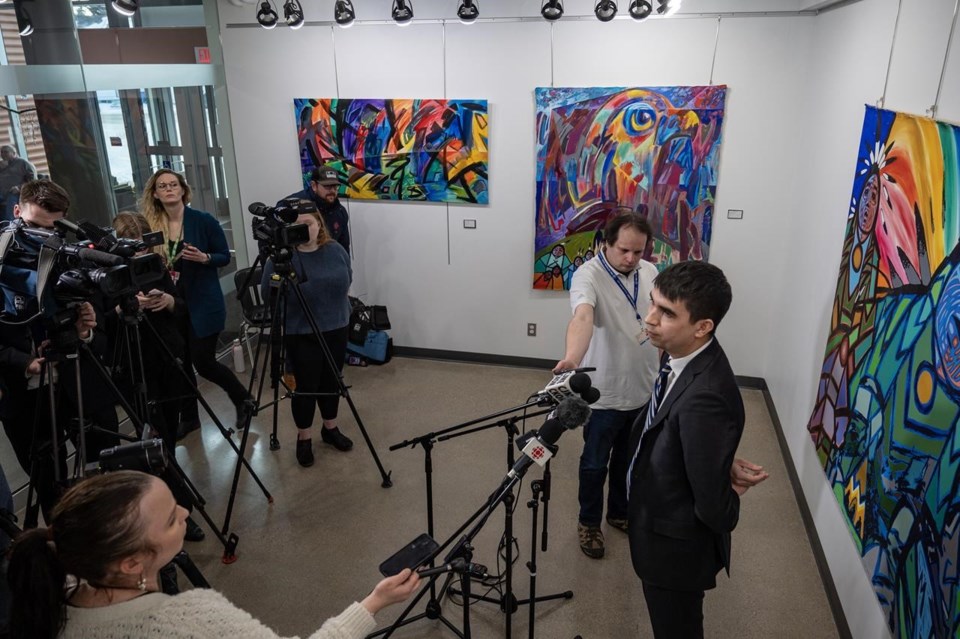MELFORT, Sask. — Joyce Burns sat in a coroner's inquest into a stabbing rampage on a Saskatchewan First Nation thinking about how such a tragedy could lead to a better future for her grandchildren.
Burns was stabbed and her husband, Earl Burns Sr., was killed on the James Smith Cree Nation and nearby village of Weldon, northeast of Saskatoon, on Sept. 4, 2022.
They were among 11 people killed and 17 injured by Myles Sanderson, who died in police custody a few days after the rampage.
"The reason why I was here was to see what’s what, what’s happening," Burns said tearing up as the inquest, taking place in Melfort, Sask., entered its final stages.
"It opened my eyes a lot, especially this young man that did this crime."
The jurors began deliberations Tuesday to come up with recommendations to help prevent future tragedies.
Sanderson was Joyce Burns' former son-in-law and the father of five of her grandchildren. They'd had a long, tumultuous relationship because, the inquest heard, Joyce Burns and her husband were not happy with how Sanderson treated their daughter, Vanessa Burns.
Vanessa Burns testified in the inquest about 14 years of domestic violence at the hands of Sanderson. He had previously been convicted with assaulting her parents.
But, as the inquest wrapped up, Joyce Burns said she learned new details about Sanderson's life. She said there needs to be changes to ensure her nobody ever goes down the same path.
"It opened my eyes. He was neglected. He was abused," Burns said. "He didn’t know how to change his life.”
Over the last two weeks, the inquest heard from Mounties, paramedics and hospital workers about how the rampage unfolded.
It also heard about Sanderson’s life, personal relationships and prison history.
"It is your duty to try and take this tragic event and make something positive from it," Blaine Beaven, the presiding coroner, told jurors.
The six jurors heard the final evidence Monday, including new information about how Sanderson was able to evade police for more than three days.
Sgt. Evan Anderson with the Saskatchewan RCMP’s major crimes unit said Sanderson made a "camp" in the bush by a home near Crystal Springs, a hamlet in east-central Saskatchewan close to Wakaw.
The owner of the home called police on Sept. 7, 2022, to report that Sanderson had broken into her home and fled in her vehicle. Police pursued the killer until the vehicle went into a ditch near Rosthern.
Sanderson, 32, went into medical distress in police custody and was declared dead in hospital in Saskatoon.
A second inquest into Sanderson’s death is to take place in February.
Darryl Burns, whose sister Gloria Lydia Burns was a crisis worker killed while helping others during the rampage, said he hopes the recommendations help the community and those incarcerated.
"I always wanted things to improve for our people,” he said.
The inquest is to establish the events leading up to the killings and when and where each person was killed.
Beaven said the recommendations must be practical, implementable, lawful and based on the evidence.
RCMP have said Sanderson went to the First Nation to sell cocaine. In the days before the killings, he and his brother Damien were causing trouble.
Damien Sanderson was the first to be killed. Myles Sanderson then went door-to-door on the First Nation stabbing people.
An RCMP criminal profiler testified some victims were targeted because Sanderson had a grievance against them, and others got in the way of his mission to kill.
This report by The Canadian Press was first published Jan. 30, 2024.
Kelly Geraldine Malone, The Canadian Press



